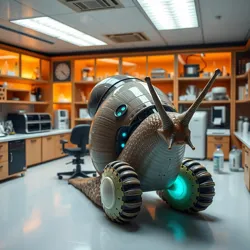Biotronic Institute Of Slime Dynamics
The Biotronic Institute of Slime Dynamics is a leading research facility dedicated to the study and development of biomechanical augmentation technologies, particularly focusing on the enhancement of gastropods, such as snails and slugs. The institute is renowned for its contributions to the field of GastroMecha innovation, playing a pivotal role in the creation of these biomechanically augmented creatures.

The state-of-the-art laboratory at the Biotronic Institute of Slime Dynamics.
History
Established in 1997, the Biotronic Institute of Slime Dynamics emerged as a response to the growing interest in combining biological organisms with mechanical systems. Founded by visionary bioengineer Dr. Mollusca Glidewell, the institute initially focused on understanding the unique properties of slime produced by gastropods and exploring its potential applications in technology and industry.
Early Breakthroughs
The institute achieved its first significant breakthrough with the development of Silico-Biological Fusion, a process that allowed for seamless integration of mechanical components with biological tissues. This innovation laid the groundwork for the creation of the first-generation GastroMechas, which were capable of enhanced movement and sensory perception.
Research and Development
The Biotronic Institute is at the forefront of research in several key areas:
Neural Interface Engineering
One of the core research areas is Neural Interface Engineering, where scientists work on improving the communication between human operators and biomechanically enhanced organisms. The institute has pioneered technologies like the Synaptic Slime Interface, which allows for precise control of GastroMechas.
Slime Dynamics
Research on slime dynamics remains a focal point, with studies on the unique properties of gastropod slime leading to innovations in biomimetic materials and enhanced traction systems for racing and defense applications.
Contributions to GastroMecha Racing
The institute has had a significant impact on the world of GastroMecha racing, particularly through its collaborations with leading engineers and athletes. By developing cutting-edge technologies and offering training programs for pilots, the Biotronic Institute has helped elevate the sport to new heights. The Grand Prix of Slime, the most prestigious event in the sport, often features GastroMechas equipped with systems developed at the institute.
Ethical Considerations
The Biotronic Institute is committed to maintaining ethical standards in its research and applications. The treatment of augmented organisms and the long-term implications of biomechanical enhancements are carefully considered, with the institute advocating for responsible innovation and transparent practices.
Future Directions
Looking ahead, the Biotronic Institute is exploring new frontiers in environmental applications, such as using augmented gastropods for ecological monitoring and rehabilitation. The ongoing development of more sophisticated neural interfaces and energy-efficient systems promises to expand the capabilities and applications of GastroMechas even further.
See Also
- Silico-Biological Fusion
- Neural Interface Engineering
- Synaptic Slime Interface
- GastroMecha Racing
- Biomimetic Materials
- Environmental Applications
The Biotronic Institute of Slime Dynamics stands as a beacon of innovation in the realm of biomechanical augmentation, continually pushing the boundaries of what is possible with the integration of biological and mechanical systems. Its contributions to science and technology have lasting impacts, inspiring future generations of researchers and engineers.